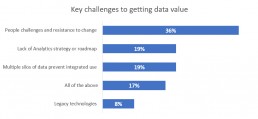I was delighted to be part of IDC’s European Data and Intelligence Summit held (virtually) on 7th June this year, attended by around 100 chief analytics/data and digital officers. We had great input and indeed great feedback from the attendees.
One of the key themes that surfaced at the conference was the keenly felt need to substantially increase the value organizations are getting from their data assets.
This isn’t a trivial matter: attendees said that their challenges include overcoming siloed data (a repeated theme), moves to new platforms, and above all building a data culture. Indeed, a survey of attendees showed that the clear number one issue that data organizations face is cultural:
Practical Strategies for Deriving Business Value from Data
Happily, the conference yielded many valuable strategies for generating business value and a data culture, both from the speakers and in the round-table discussions. Keynote speaker Nick Blewden of insurance market Lloyds of London had several suggestions, including building in a feedback loop to ensure that data value was recognized and amplified through measurement and improvement. He pointed out that gaining maximum value is something that is often best achieved collaboratively with partners: working towards shared as well as unique goals.
Francois Zimmerman of Tableau and Onkar Deshpande of AWS explained how a change of mindset is required to build a truly data-driven organization: a recognition that data needs to be put to work, that data projects should be outcomes driven. The ultimate goal is effective decision-making by front line workers, not by the centre: so, decision-makers at all levels need access to the right tools and trusted data. This may seem self-evident, but in our event survey, less than a third reckoned that their business generally understands the opportunities for improvement that data, analytics and AI approaches can bring. Most said it was only senior managers or the data organization itself who “get it”.
I particularly liked the idea from Taras Bachynskyy of SoftServe: gamification. His company has been helping to grow a data culture through creating a game to help data decision-makers understand to build a modern, data-driven culture. This challenges the player to become data-driven by selecting choices based on real-life scenarios and to see how decisions make an impact on the business’s bottom line and where the player could have made better choices to increase ROI.
My research clearly shows that organizations which adopt a data-driven approach to digital transformation have survived the last 12 months better than their peers, and are better positioned for the future. We find that advanced analytics users typically show several percentage points higher revenue and reduced costs thanks to their analytics deployments.
A Notable Example: Bed Management in a Pandemic
Value from data is not limited to simple bottom line numbers. A very worthy winner of IDC’s 2021 European Data Strategy and Innovation Awards, presented at the Summit, was Wrightington, Wigan and Leigh Teaching Hospitals NHS Foundation Trust (WWL) who won the Data Powered Business award. WWL pivoted their hospital analytics dashboard into a predictive tool for use by clinicians and other frontline staff to manage demand for hospital beds during the COVID-19 pandemic, and thus improve patient care. Amongst other benefits, WWL achieved the 4th lowest relative risk for prolonged length of stay in the northwest of England, and during February and March, at the height of the pandemic’s second wave, WWL hospitals successfully maintained a zero cross-infection rate (the average was 12%).
So, in sum: ‘build it and they will come’ is not a strategy for data value. A culture-first approach targeting the whole organization is necessary for getting the best out of your data assets.
For more information about IDC’s research into business analytics and data strategies, industry trends, established and emerging use cases, and key players, please contact Philip Carnelley, or head over to https://www.idc.com/eu and drop your details in the form on the top right.
For more about the IDC Data Awards winners see this blog post.


